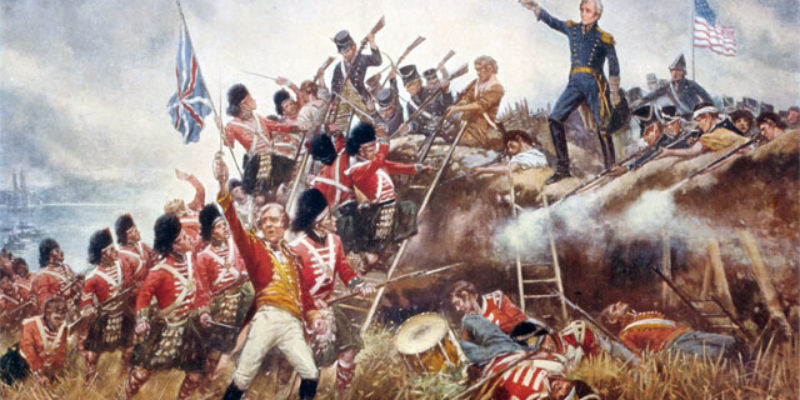Having grown up near the site where Andrew Jackson led the successful defense of New Orleans in the waning days of the War of 1812, America’s second large-scale conflict with the Mother Country has been of great interest for most of my life, though that puts me in the extreme minority of my countrymen when it comes to America’s first forgotten war.
Aside from Baltimore and New Orleans (more Chalmette than the city), the Bicentennial of the War of 1812 passed without much notice nor national commemoration.
So when the US Men’s National Team match with England in the World Cup ended in a scoreless tie, memes mocking America’s “assorted competitive records” against the English floated around social media, with many referencing a “draw” in the War of 1812.
Amusingly this led to a hundreds of students of military history blowing up these sports-centric memes to take great issue with the war’s outcome being classified as a draw.
So before the War of 1812 slips out of the American consciousness just as quickly as it reappeared, there are a few points about the conflict I’d like to cover.
First, the causes.
As the War of 1812 occurred near the peak of the Napoleonic Wars, London was more distracted with the little Corsican with the large hat than they were with the fledgling US. However the Brits were in need of experienced sailors and what they could not find at home they filled their ranks by essentially kidnapping on the high seas through “impressment” under the guise of merely returning to His Majesty’s Service those sailors who had snuck off for a better life crewing an American merchant ship.
Granted some of the men they nabbed were indeed service fugitives others were conveniently taken regardless of claims. Either way, America took exception at such disrespect on the high seas.
On the frontier, British agents were doing what they could to incite Native American tribes to attack frontier settlers pushing westward to stile expansion.
But the United States smelled opportunity to parlay these very real grievances towards land snatching by invading Canada.
Second, there’s the war itself.
It truly did not go well for the US, at least on land. The invasion of Canada was a fiasco.
And one of the few triumphs was the burning of York (now Toronto) which the British avenged by burning public buildings in Washington.
After taking Washington, British commander Robert Ross was explicit that no private property would be harmed though houses that offered resistance would be torched- a structure across from the US Capitol bears witness to that policy.
Furthermore Britain and their Native American allies would seize parts of Maine and western New York State. Of course the aforementioned capture of the nation’s capital stands out though the British had no intention on holding the seat of US government as it possessed little strategic nor economic value compared to Baltimore, Boston, Philadelphia, or New York City.
However, the British would fail in their plan to take Baltimore and would surprisingly lose a number of naval battles. And General Ross, the victor of Washington, would be killed in battle not long after his greatest triumph.
And then there was New Orleans. Replacing the slain Ross was the Duke of Wellington’s brother-in-law, General Edward Pakenham- who had distinguished himself as a commander in the Peninsular Campaign against Napoleonic France.
Advertisement
Upon the plains of Chalmette on January 8, 1815 Pakenham along with over 1500 of his men would take a bullet from an outnumbered patchwork of professional soldiers, privateers, local militia, volunteers, and Choctaw warriors who successfully turned back what arguably was the mightiest army on earth.
American casualties amounted to a mere 13 dead.
The Battle of New Orleans would go down as the worst British military disaster until the fall of Singapore in World War II.
And while a treaty ending the war had been signed weeks before the battle, British forces still proceeded with their operation to take New Orleans with that knowledge.
Though the US did not gain any land in the war, impressment came to an end, the British stopped making mischief on the frontier, and the young country had its captured territory returned to it. Britain had already made Maine into the colony of New Ireland and were insistent upon retaining this territory as reparations for the war but left Ghent empty handed.
While the US didn’t get to have what they didn’t seize, Britain couldn’t keep what they had already taken.
And having their top two generals return home inside casks of rum is not exactly spiking the football (or soccer ball) on a successful enterprise.
In contrast Jackson would become a national hero and later president (once again not the accolades of someone who scored a tie), the anniversary of the Battle of New Orleans would serve as a de facto national holiday, and a recounting of the Battle of Baltimore would be set to music as our national anthem.
Hopefully this afternoon the US soccer team fares better than a draw against Iran as the ignominy of being punted out the World Cup by the world’s leading sponsor of terrorism and a perpetual source of consternation would be tremendous.
But when it comes to the War of 1812, there should be no question as to that outcome.
Advertisement
Advertisement

